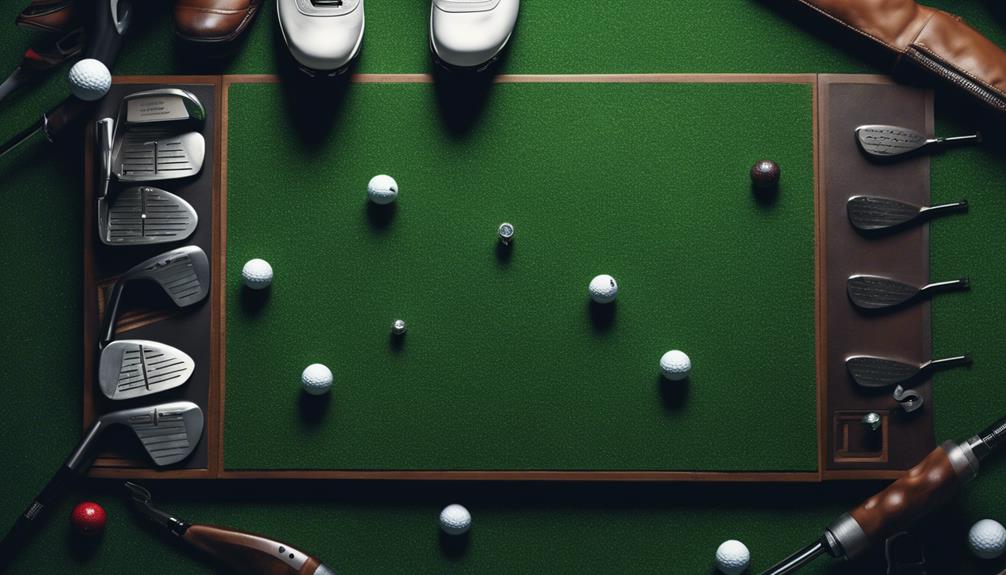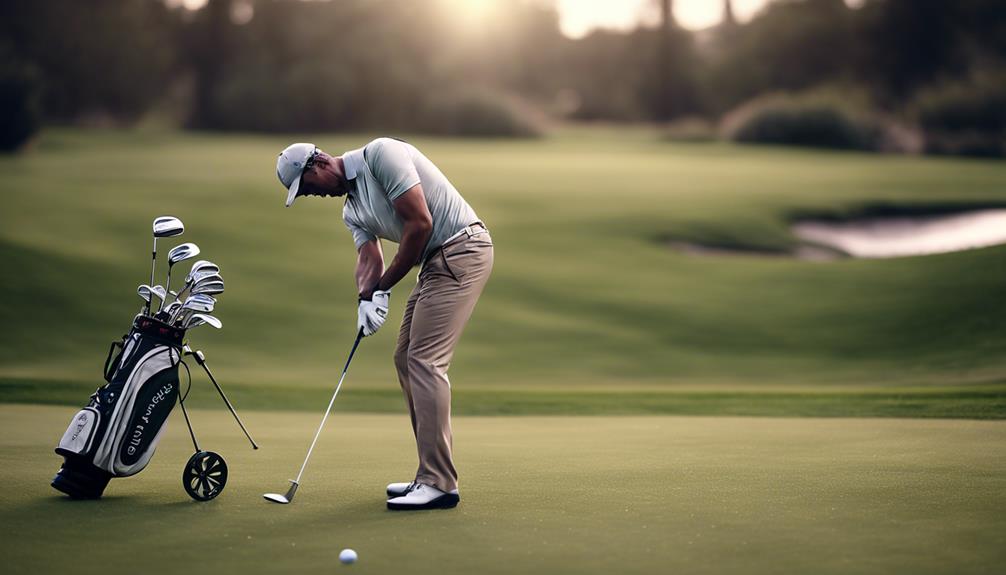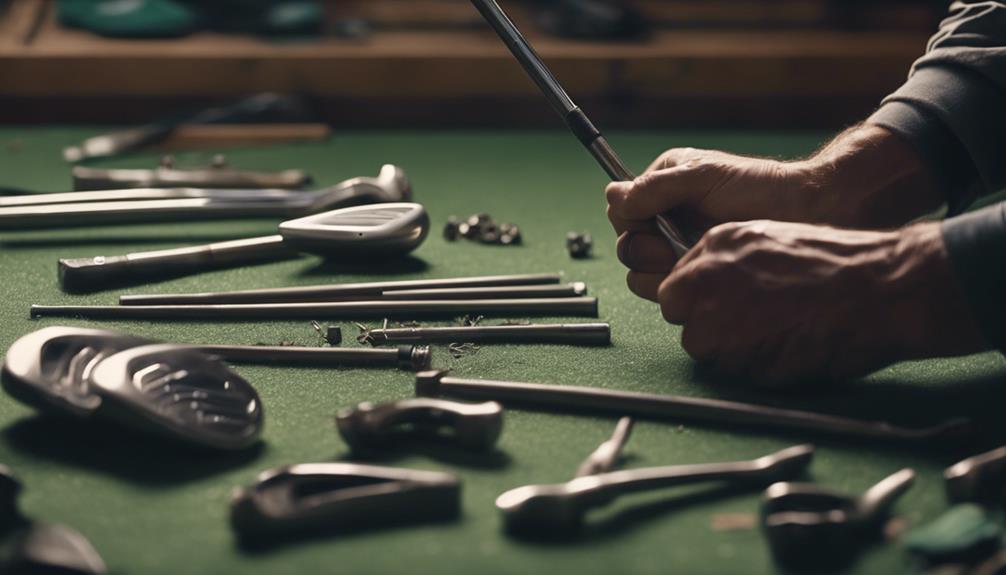- 7 Top Flite Golf Clubs XL for Improved Performance - September 28, 2024
- Top Flite Golf Clubs: Top 5 Reasons to Choose Them - September 28, 2024
- Top 3 Golf Club Fitters for a Perfect Swing - September 28, 2024
As a low handicapper or professional, you demand irons that deliver precision, control, and workability, sacrificing forgiveness for the ultimate in shot-shaping capabilities. Look for irons with compact head shapes, smaller sweet spots, and less forgiveness, such as the Cobra King Tour Iron, TaylorMade P7MC 2023 Iron, and Mizuno Pro 243 Iron. Steel shafts provide more feedback and control, making them popular among low handicappers and professionals. Custom fitting is key to determine the right flex, length, and lie angle. By understanding your needs and preferences, you'll be able to tap into your full potential on the course, and discover what sets the best irons apart.
Key Takeaways
- Low-handicap golfers require irons with precise designs, sacrificing forgiveness for control and workability, and often opt for forged construction for a soft yet solid feel.
- Steel shafts are popular among low handicappers and professionals due to their ability to provide more feedback and control, while graphite shafts offer increased swing speed.
- Compact clubhead designs with minimal offset are preferred by low-handicap golfers, allowing for precise shot shaping and trajectory control.
- Top-performing irons for professionals, such as the Cobra King Tour Iron and TaylorMade P7MB Iron, deliver tour-proven performance and precise shot shaping capabilities.
- Custom fitting is essential for low handicappers to determine the right flex, length, and lie angle, ensuring the ideal irons tailored to their unique swing characteristics and preferences.
Top Irons for Low Handicappers
When selecting the right irons, low-handicap golfers typically seek out clubs that offer a more precise and workable design, sacrificing some forgiveness for the ability to shape shots with precision and control.
You, as a skilled player, require irons that provide a high level of accuracy and maneuverability.
Players irons, such as the Cobra King Tour Iron, TaylorMade P7MC 2023 Iron, and Mizuno Pro 243 Iron, are designed with forged construction to deliver a soft yet solid feel. These irons feature compact head shapes, smaller sweet spots, and less forgiveness, allowing you to shape shots with precision and control.
The Titleist 2023 T100 Iron and Srixon ZX7 Mk II Iron also offer a high level of workability, with a focus on distance and stability.
Club Features to Consider
When considering golf clubs, you'll want to examine the shaft material options, as they profoundly impact the club's overall performance and feel.
The clubhead design elements, such as the size, shape, and offset, also play a vital role in determining the club's forgiveness, workability, and distance.
Shaft Material Options
Considering your swing style and preferences, you'll want to weigh the benefits of graphite versus steel shafts, each offering distinct advantages regarding feel, control, and distance.
Graphite shafts are lighter, which can increase your swing speed, but may reduce feel and control for low handicappers who prefer a more precise game.
On the other hand, steel shafts provide more feedback and control, making them a popular choice among low handicappers and professionals who value precision over distance.
When selecting a shaft material, you should also consider the kick point and torque rating.
Shafts with a higher kick point, typically found in graphite shafts, can help launch the ball higher and farther, but may reduce spin and control.
If you prefer a softer shaft, a lower torque rating can reduce twisting and improve accuracy.
Tour-level players often opt for shafts with a higher weight and stiffer tip section to maintain control and precision throughout the swing.
Ultimately, the right shaft material for you'll depend on your individual swing characteristics and preferences.
Clubhead Design Elements
Low-handicap irons typically boast a compact shape with a shorter blade length and thinner topline, allowing for more precise control and workability. This design enables you to shape shots with confidence and maintain a consistent trajectory.
Additionally, minimal offset is often preferred by low-handicap golfers to reduce slice and allow for more precise shot shaping and trajectory control.
A higher center of gravity in the clubhead can launch the ball lower and spin it more, punishing thin shots and requiring more precise ball-striking. However, some irons incorporate high-density tungsten weighting to increase MOI and provide more forgiveness while maintaining a compact clubhead shape.
When testing irons, pay attention to the feel and sound of the clubhead at impact, which can be influenced by design elements such as the type of metal used, the thickness of the face, and the presence of inserts or dampening materials.
Our Testing and Evaluation

We know that the golf clubs we recommend are truly the best for low handicappers because we've put them through a rigorous testing process that combines cutting-edge technology with the expertise of our Golf Monthly test team.
We use an indoor simulator at Foresight Sports, equipped with premium balls and the GCQuad launch monitor, to collect precise data on ball speed, launch angle, spin rate, and carry distance.
Our testers evaluate irons at West Hill Golf Club, a course with exceptional practice facilities, to assess their performance under real-world conditions, including distance, accuracy, and forgiveness.
Our team consists of experienced golfers with handicaps ranging from scratch to 12, ensuring that our testing process is thorough and representative of a variety of playing styles and abilities.
Manufacturers can't pay for good reviews, so our conclusions are based solely on testing and experience, ensuring that our results are trustworthy and unbiased.
Top Picks for Professionals
As you explore the top picks for professionals, you'll notice that elite players expect clubs that deliver tour-proven performance and precise shot shaping capabilities.
These clubs must meet the highest standards, providing a level of consistency and control that allows professionals to dominate on the course.
With these expectations in mind, it's no surprise that clubs like the Cobra King Tour Iron, Titleist T100 Iron, and TaylorMade P7MB Iron are favored by top players.
Elite Player Expectations
When it comes to their irons, elite players demand exceptional performance, expecting a precise blend of feel, control, and workability to consistently deliver high-quality shots under intense pressure.
As a professional, you require irons that can keep up with your skill level, providing superior distance control and a consistent ball flight.
Compact head shape and minimal offset allow for a more precise strike and greater shot-shaping capabilities.
Heavier head weight and stiffer shaft enable you to generate more speed and maintain control throughout the swing.
Forged irons provide a softer feel and more consistent feedback compared to cast irons.
Custom-fitting allows for adjustments to the lie, loft, and shaft flex to optimize performance and consistency tailored to your unique swing characteristics.
Tour-Proven Performance Clubs
The best irons for professionals, like those used on the PGA Tour, offer a precise blend of performance, feel, and control, and we've narrowed down the top picks to a few tour-proven options that excel in these areas.
The Cobra King Tour irons stand out with their 5-step forging process, providing a soft feel and precise center of gravity.
The Titleist T100 Irons, with their compact head shape and minimal offset, are designed for tour players and better ball strikers, offering a precise center of gravity for improved launch conditions.
Srixon's ZX7 MKII Irons feature a new Pureframe design, enhancing feel and performance with an 80% thicker portion of carbon steel behind the sweet spot.
For a more traditional feel, the TaylorMade P7MB Irons, made from 1025 Steel and forged by a 2000lb press, provide a solid feel on centered strikes.
Precise Shot Shaping Tools
To take their game to the next level, professionals and low handicappers rely on precise shot shaping tools that offer unparalleled control, workability, and consistency, and these top picks deliver.
When you need to work the ball, you require irons that provide the ultimate level of precision and feel.
Cobra King Tour Iron: Offers a near-flawless look and solid, stable feel at impact with consistent flight and forgiveness.
Titleist T100 Iron: Features a split tungsten weighting inside a dual cavity for a soft yet solid feel, providing forgiveness and stability.
TaylorMade P7MC 2023 Iron: Provides a soft feel with a hint of spring, allowing for shot-making creativity due to its lack of forgiveness.
Mizuno Pro 243 Iron: Offers a soft yet lively feel and excellent acoustics, thanks to its forged cavity-backed design with a Microslot for more launch and faster ball speeds.
These clubs are designed for ball strikers who demand the best.
With their forged feel and precise shaping capabilities, they'll help you take your game to new heights.
Best Irons for Shot Shaping

With precision and control being paramount for low handicappers, selecting irons that allow for effective shot shaping is essential to gaining a competitive edge.
You're looking for irons that provide a high level of workability, allowing you to manipulate trajectory, spin, and direction with precision. Forged and bladed irons are ideal for shot shaping, as they offer a more compact head shape and a thinner face, providing greater control over the ball.
When it comes to low handicap irons, you should prioritize those with a smaller sweet spot, as they require a more precise strike to achieve ideal results.
This will help you develop a more consistent swing and improve your overall ball-striking. Additionally, irons with a higher center of gravity will help you achieve a more penetrating ball flight, making them ideal for shaping shots around the course.
Low Handicap Iron Buying Guide
As you seek to optimize your iron play, selecting the right set of irons becomes a vital decision that can substantially impact your overall performance and scoring. As a low handicap player, you require irons that offer control, precision, and flexibility, rather than game-improvement features. Traditional loft models are still a good option, providing the desired level of control, but game-improvement clubs can also be a good fit, depending on the design.
When choosing irons, consider the following key factors:
- Forgiveness: Look for irons that offer a balance between forgiveness and workability
- Feel: Opt for irons that provide a responsive feel and precise feedback
- Distance: Consider irons that offer consistent distance control and dispersion
- Aesthetics: Choose irons that appeal to your visual preferences and provide a sense of confidence
Custom fitting is essential for low handicappers, as it helps determine the right flex and length of shaft, lie angle, and iron head for your game. With so many highly rated options available, such as the Cobra King Tour Iron and Titleist 2023 T100 Iron, it's important to prioritize your needs and preferences to find the perfect fit.
Customizing Your Irons Fit

You'll greatly benefit from a custom fitting session that helps tailor your irons to your unique swing characteristics and preferences, ensuring the best possible performance from your game.
During this session, you'll work with a fitter to determine the ideal iron head, shaft length, flex, lie angle, and grip size for your swing.
The right shaft is vital, as it affects ball speed, launch angle, spin rate, and overall distance. Popular options for low-handicap golfers include the KBS Tour, Dynamic Gold, and Project X.
Lie angle adjustments can have a profound impact on shot direction and accuracy, with most low-handicap golfers preferring a slightly upright lie angle to combat a tendency to hit the ball too low.
Additionally, grip size and style are important considerations, as they influence your ability to consistently strike the ball out of the center of the clubface.
Many manufacturers offer custom fitting services, either online or in-store, to help you find the perfect fit.
Improving Your Game With Irons
By selecting irons that cater specifically to your skills, you can refine your game and access a new level of precision and control.
As a low handicapper, you require irons that prioritize control, precision, and flexibility, allowing you to fine-tune your shots and dominate the course.
Forged head irons provide a premium feel and performance, making them a popular choice among low handicappers and professionals.
Custom fitting is essential to find the right flex and length of shaft, lie angle, and iron head for your game, ensuring the best golf clubs suited for your needs.
Traditional loft models can still be a good option for low handicappers, providing the desired level of control and precision.
Game improvement irons have evolved, offering smaller, more refined designs that can be suitable for low handicappers who require some level of forgiveness and distance.
Frequently Asked Questions
What Is Considered a Low Golf Handicap?
You're considered a low handicapper if your scoring average falls within a specific handicap range, typically 0-10, indicating a high skill level, where you consistently shoot in the 70s or lower with precision and control.
What Is a Mid-Handicap Golfer?
You're stuck in the middle, not quite a pro, but far from a beginner – that's where you'll find yourself as a mid-handicap golfer, refining your swing technique, mastering ball control, and shifting your mindset to break through to the next level.
What Are the Best Golf Clubs for a 65 Year Old Man?
As you navigate your 65-year-old swingstyle, prioritize clubs with senior flexibility, focusing on age-appropriate forgiveness and a larger sweet spot to compensate for potential loss of speed and accuracy in your elderly game.
What Is a More Forgiving Golf Club?
You'll find a more forgiving golf club by looking for iron designs with larger sweet spots, perimeter weighting, and lower centers of gravity, which help compensate for inconsistent golf swings and off-center club head strikes.
Conclusion
As you step onto the course, the fate of your game hangs in the balance.
Will you dominate the competition or fall short?
The right irons can make all the difference.
You've narrowed down your options, but the final choice remains.
Will you opt for precision and control or power and forgiveness?
The answer lies in your hands.
The game is on, and the clock is ticking.
Which irons will you choose to take your game to the next level?




